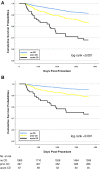Cardiac decompensation of patients before transcatheter aortic valve implantation-clinical presentation, responsiveness to associated medication, and prognosis
- PMID: 37942071
- PMCID: PMC10627789
- DOI: 10.3389/fcvm.2023.1232054
Cardiac decompensation of patients before transcatheter aortic valve implantation-clinical presentation, responsiveness to associated medication, and prognosis
Abstract
Aims: Cardiac decompensation (CD) in patients with aortic stenosis is a "red flag" for future adverse events. We classified patients undergoing transcatheter aortic valve implantation (TAVI) into those with acute, prior, or no prior CD at the timepoint of TAVI and compared their clinical presentation, prognosis, and effects of the prescribed medication during follow-up.
Methods: Retrospective analysis of patients of one center fulfilling the criteria of 30-day device success after transfemoral TAVI.
Results: From those patients with no CD (n = 1,985) ranging to those with prior CD (n = 497) and to those with acute CD (n = 87), we observed a stepwise increase in the proportion of patients in poor clinical condition, NYHA class III/IV, low psoas muscle area, fluid overload (rales, oedema, pleural effusion), reduced ejection fraction, renal insufficiency, and anemia. More diuretics but less renin-angiotensin system inhibitors (ACEI/ARB) were prescribed for patients with acute CD compared to other groups. Prior CD (hazard ratio and 95% CI 1.40; 1.02-1.91) and acute CD (1.72; 1.01-2.91), a reduced general condition (1.53; 1.06-2.20), fluid overload (1.54;1.14-2.08), atrial fibrillation (1.76; 1.32-2.33), and anemia (1.43;1.08-1.89) emerged as strong independent predictors of one-year mortality. In all three classes of CD, prescribing of ACEI/ARB was associated with a substantial improvement of survival.
Conclusions: The clinical presentation of (acute or prior) cardiac decompensation in patients with AS overlapped substantially with that of patients with classical signs of heart failure. Our results may support an early treatment strategy in patients with left ventricular dysfuntion before clinical signs of congestion are manifest. Moreover, these patients require intensive medical attention after TAVI.
Keywords: angiotensin receptor blockers; angiotensin-converting enzyme inhibitors; aortic stenosis; cardiac decompensation; heart failure; prognosis; transcatheter aortic valve implantation (TAVI).
© 2023 Fischer-Rasokat, Renker, Charitos, Strunk, Treiber, Rolf, Weferling, Choi, Hamm and Kim.
Conflict of interest statement
UF-R: none. EC: proctor fees from Boston Scientific. MR: speaker fees from St. Jude Medical/Abbott. CS: none. JT: none. AR: none. MW: speaker fees from Boston Scientific. Y-HC: proctor/speaker/scientific advisor fees from Getinge, Jotec/CryoLife, Cytosorbents. CH: advisory board Medtronic. W-KK: proctor/speaker fees from Abbott, Boston Scientific, Edwards Lifesciences, Medtronic, Meril Life Sciences, Shockwave Medical.
Figures


References
-
- Chen S, Redfors B, Crowley A, Ben-Yehuda O, Summers M, Hahn RT, et al. Impact of recent heart failure hospitalization on clinical outcomes in patients with severe aortic stenosis undergoing transcatheter aortic valve replacement: an analysis from the PARTNER 2 trial and registries. Eur J Heart Fail. (2020) 22(10):1866–74. 10.1002/ejhf.1841 - DOI - PubMed
-
- Fischer-Rasokat U, Renker M, Liebetrau C, Weferling M, Rieth A, Rolf A, et al. Predictive value of overt and non-overt volume overload in patients with high- or low-gradient aortic stenosis undergoing transcatheter aortic valve implantation. Cardiovasc Diagn Ther. (2021) 11(5):1080–92. 10.21037/cdt-21-286 - DOI - PMC - PubMed
LinkOut - more resources
Full Text Sources
Research Materials

